As an Amazon Associate, I earn from qualifying purchases, and this post contains affiliate links to products I love ♥ See my full disclaimer here!
Antique jars have a certain charm and appeal that can add a touch of vintage flair to any kitchen. However, when it comes to canning food, it is essential to consider if you can use antique jars for canning.
In this blog post, we will explore the question, “Can you use antique jars for canning?” and provide insights into why using antique jars for canning is not recommended. Whether you are a novice or an experienced canner, this post will help you make informed decisions about the safety and effectiveness of antique jars for canning.
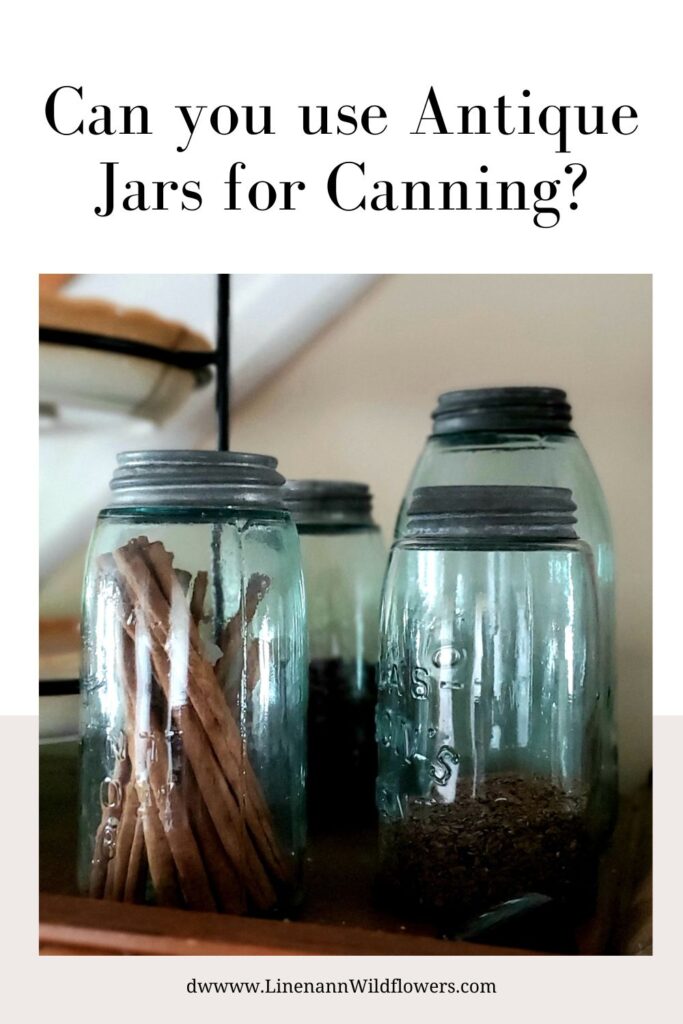
If you have been following me for a while now, you know I have quite of collection of antique mason jars. Not only do I use them for storing dry goods but for decorative use as well. From vintage clear glass jars to ball mason jars, they serve a purpose in my home.
I love using antique Mason jars in my home for various purposes. They are great for storing dry goods, organizing small items, and so much more. We also use mason jars as drinking glasses for a vintage look. These old jars’ unique style and charm add a touch of nostalgia and personality to any space.
Antique canning jars are more than just old kitchenware.
They are a symbol of the history and evolution of home food preservation. These iconic jars have been used for generations to preserve fruits, vegetables, and other food items. In addition, they have become highly sought after by collectors and enthusiasts alike. In this blog post, we will take a closer look at the history of antique canning jars, explore their unique features and designs, and share tips for identifying and using these vintage treasures. Whether you are a seasoned collector or simply curious about the world of antique canning jars, this post will offer a wealth of interesting information and insights.
Antique jars can be visually appealing and may have sentimental value, but they are not recommended for canning food.
There are several reasons for this:
- Safety concerns: Antique jars were not designed or tested for canning and may not withstand the high temperatures and pressures required to safely canned food. This can increase the risk of bacterial contamination, spoilage, and even botulism.
- Quality concerns: Antique jars may have hairline cracks, chips, or other defects that can compromise the integrity of the jar and allow air and bacteria to enter. Even if the jars look sturdy, they may not be airtight and can lead to food spoilage.
- Availability concerns: Some antique jars may be rare and hard to replace. Finding a replacement may be difficult or impossible if a jar breaks during the canning process.
For safe canning, it is recommended to use jars specifically designed for canning and made by reputable manufacturers. These jars are designed to withstand the high temperatures and pressures of canning and have been tested to ensure their safety.
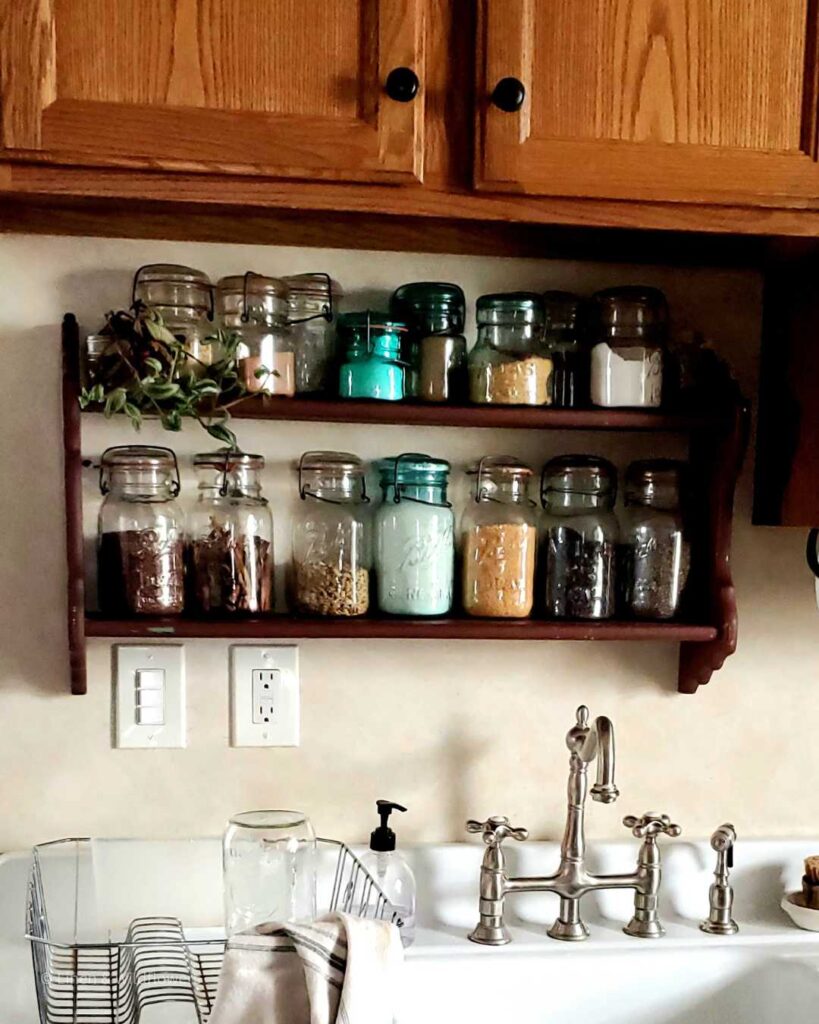
So, Can you use Antique Jars for Canning?
While antique jars can be used for canning, it is not recommended to use vintage or antique canning jars for food preservation. This is because they may not be designed to withstand the high temperatures and pressure of the canning process. In addition, the rubber seals on the lids may have deteriorated over time, allowing bacteria to enter the jar and spoil the food. It’s safer to use modern jars designed explicitly for canning to ensure the safety and quality of the preserved food. If you still want to use antique jars. It’s best to use them for home decor & dry goods and to avoid using them for canning and instead store dry goods or non-food items.
Concerns about lead in Antique Mason Jars
There are concerns about lead in antique Mason jars, particularly those manufactured in the early 1900s. This is because some vintage canning jars were made using old glass that may have had the lead as a component. Lead was commonly used in glass manufacturing before the mid-20th century to improve its clarity and durability.
Lead is a toxic metal that can leach into food and cause serious health problems. Even low levels of lead exposure over time can have harmful effects, particularly in children.
If you have antique Mason jars that were manufactured before the mid-20th century, it’s possible that they may contain lead. To determine if your jars contain lead, you can test them with a lead testing kit. These kits are available at hardware stores and online.
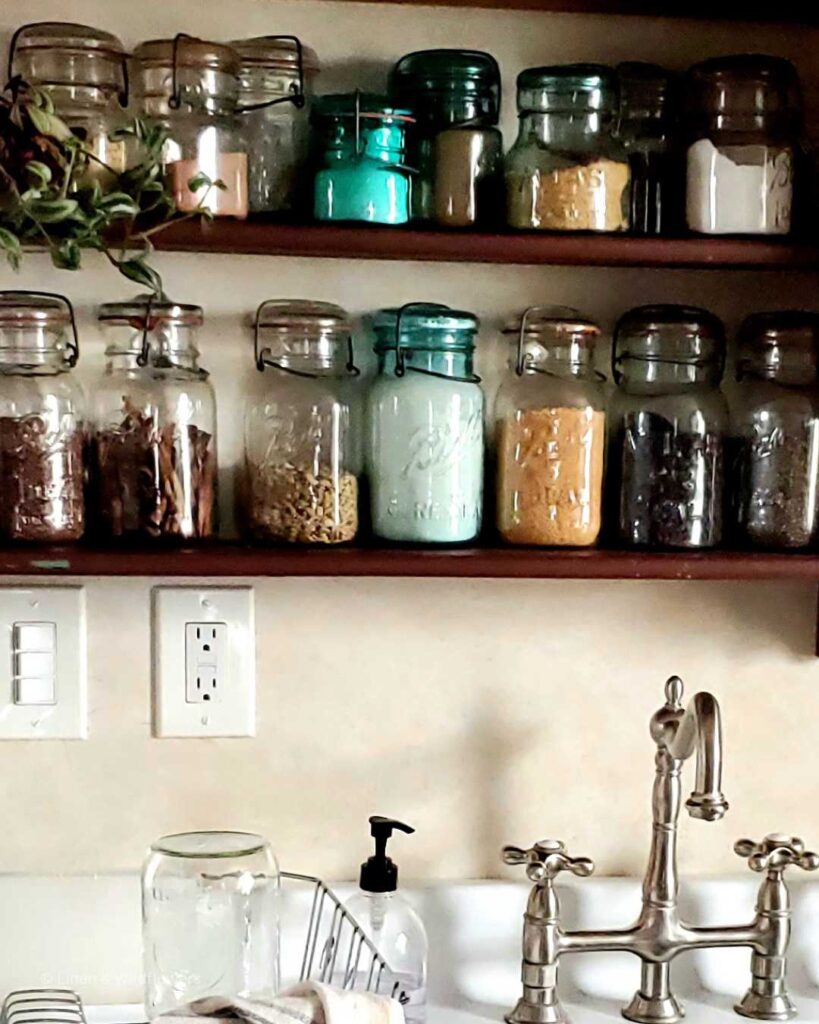
If your antique jars contain lead, it’s best not to use them for canning or storing food. Instead, use them for decorative purposes or for storing non-food items. It’s safer to use modern jars designed explicitly for canning to ensure the safety and quality of the preserved food.
Can Antique Jar be used for storing dry goods?
Antique jars can be used to store dry goods such as grains, beans, pasta, or spices. However, it is important to keep in mind there are a few things to consider:
Cleanliness
Make sure to thoroughly clean and sanitize the antique jars before using them to store dry goods. This will help ensure that any dust or residue from previous use does not contaminate your food.
Airtightness
Check the seal on the antique jars to ensure that they are airtight. A tight seal will help keep your dry goods fresh and prevent moisture and insects from getting in.
Material
Antique jars are made of glass & are good material for dry food storage. It is non-reactive and won’t affect the flavor or quality of your food. In addition, as long as the antique jar is in good condition, clean, and airtight. Furthermore, it can be a charming and functional addition to your kitchen for storing dry goods.
What’s the life expectancy of an Antique Mason Jar?
The life expectancy of an antique Mason jar can vary greatly depending on several factors, such as the jar’s age, condition, and usage. Some antique Mason jars can be in excellent condition and last many years if properly cared for and stored. However, if the jar is cracked, chipped, or damaged, its life expectancy may be significantly reduced. Additionally, if the jar is used for canning or other food preservation methods, it may be more prone to wear and tear and may not last as long. Ultimately, it’s difficult to determine a specific life expectancy for an antique Mason jar, as it can vary depending on a number of factors.
- Age and condition: Old jars may be fragile due to age and may have weakened over time, making them more prone to breakage.
- Excessive jar breakage: Old jars subjected to repeated use or stored improperly may have weakened over time and may be more prone to breaking during use.
- Old canning jars: Antique Mason jars may not meet current safety standards and may not be suitable for use in modern canning practices.
- Unknown history: When using antique jars for food preservation, it may be difficult to determine the jar’s previous use and whether it has been properly cleaned and sterilized.
- Availability of modern alternatives: While antique Mason jars may have a certain charm and aesthetic appeal, modern jars and containers are readily available and may be safer and more suitable for food preservation and storage.
Why it isn’t safe to use antique jars for canning.
Canning is a time-honored method of preserving food that has been practiced for centuries. Many people enjoy using vintage jars for canning, as they have a nostalgic charm and can be passed down through generations. However, it’s important to know that antique jars may be unsafe for canning, and using them can pose serious health risks.
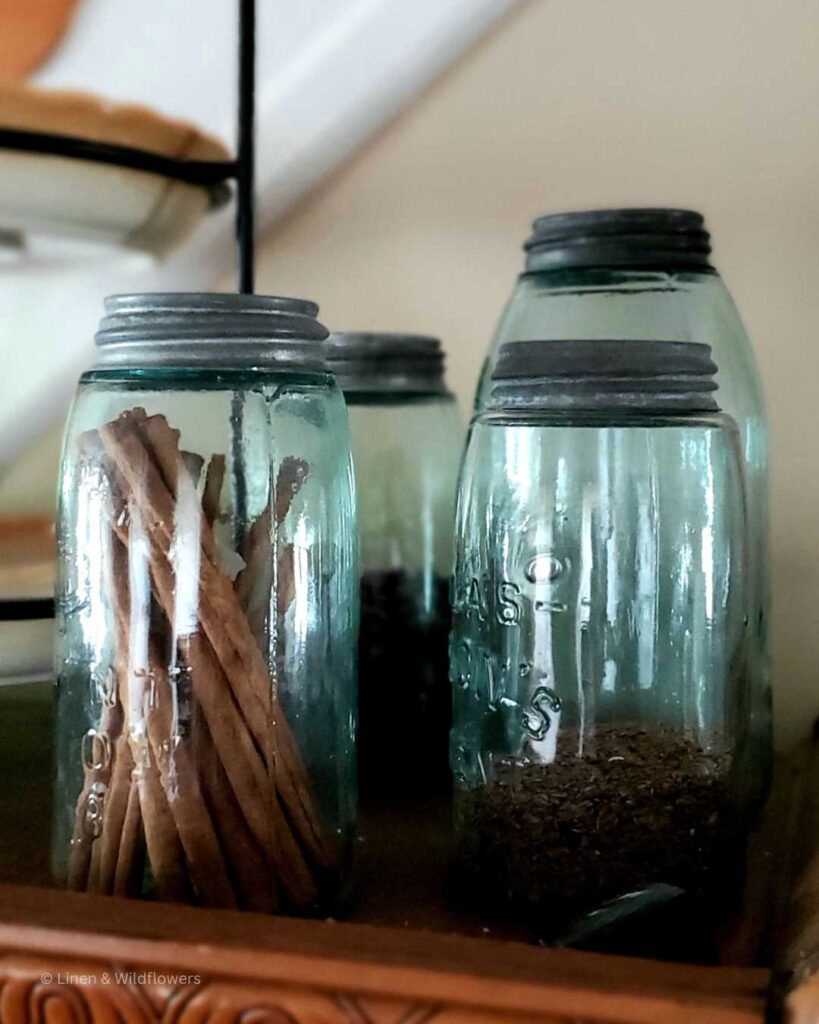
Vintage Jars
Vintage jars are typically manufactured in the early 1900s or earlier. These jars may have a unique look and feel but may not be suitable for canning. Vintage jars were not designed with the same safety standards as modern canning jars, and their construction may not withstand the high temperatures and pressures of the canning process. Additionally, vintage jars may have manufacturing defects that make them more prone to breaking or leaking during canning.
Glass Lids
Antique jars with glass lids can be particularly risky for canning. Glass lids were popular in the early 1900s. Still, they are not recommended for canning today. Glass lids may not be tempered to withstand high temperatures and can shatter or crack during the canning process. Furthermore, the seal between the glass lid and the jar may not be reliable, which can lead to contamination and spoilage.
Zinc Lids
Antique jars with zinc lids may also pose a risk during canning. Zinc lids were commonly used in the early 1900s and were designed to be used with a rubber gasket. However, the zinc can corrode over time and leach into the food. This can cause lead poisoning, which can be especially dangerous for young children and pregnant women.
Rubber Gasket
Antique jars with a rubber gasket can also be problematic for canning. Rubber gaskets were designed to create an airtight seal between the jar and the lid. However, rubber gaskets can deteriorate over time and become brittle, causing seal failures. This can lead to a failed seal, allowing bacteria to grow and spoil the food.
Glass Jars & Vintage Mason Jars
Antique glass jars, including vintage Mason jars, may be unsafe for canning. Even if the glass appears in good condition, it may not be tempered to withstand the high temperatures and pressures of the canning process. Furthermore, vintage Mason jars may not have a reliable sealing mechanism, which can lead to contamination and spoilage.
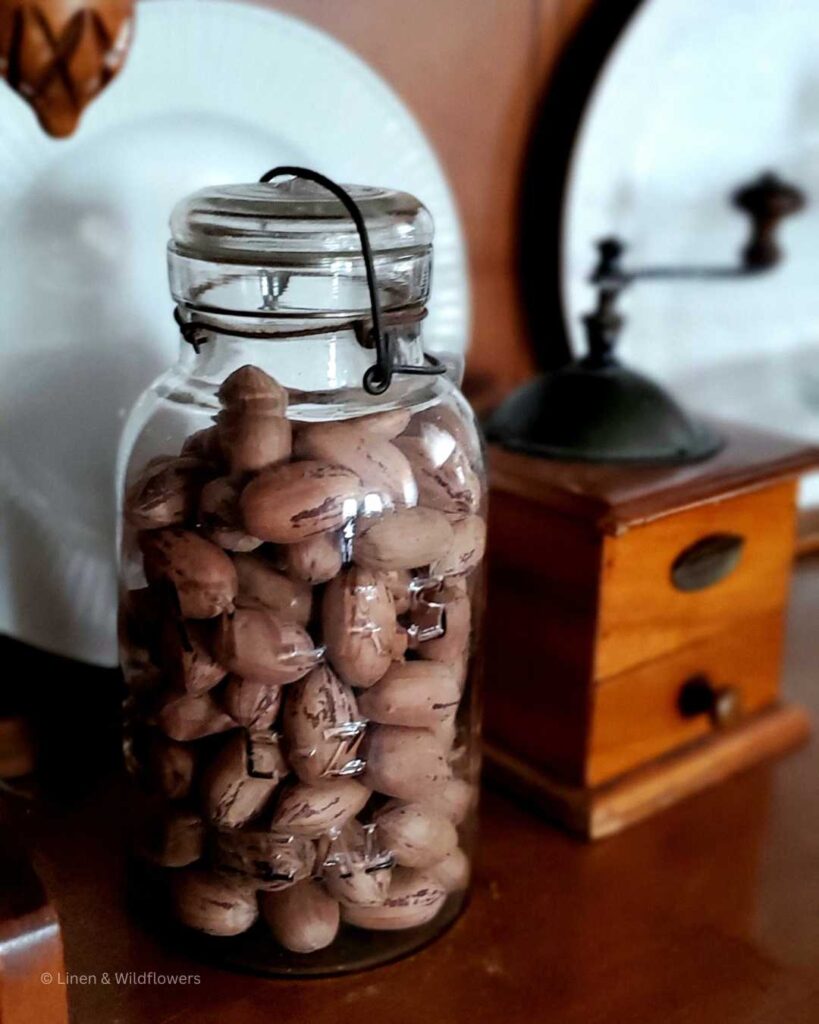
Where can Old mason jars be found?
Old Mason jars can be found in a variety of places. Here are a few places to check out!
Antique stores and Yard Sales
Many antique stores and flea markets specialize in selling vintage and antique items, including Mason jars.
Online marketplaces
Websites like eBay and Etsy often have a large selection of old Mason jars available for purchase.
Estate sales and garage sales
Estate and garage sales are great ways to find vintage items, including Mason jars, at a lower cost.
Family heirlooms
Many families have old Mason jars passed down through generations, so checking with family members can be an excellent way to find old Mason jars.
Thrift stores
Some thrift stores may have a selection of vintage and antique items, including Mason jars.
When searching for old Mason jars, it’s important to examine them for cracks or damage carefully. These can affect their usability and safety for canning or other food preservation methods.
“A man should be able to make a tool and use it, too. It’s not worth anything unless it does both.”
John L. Mason
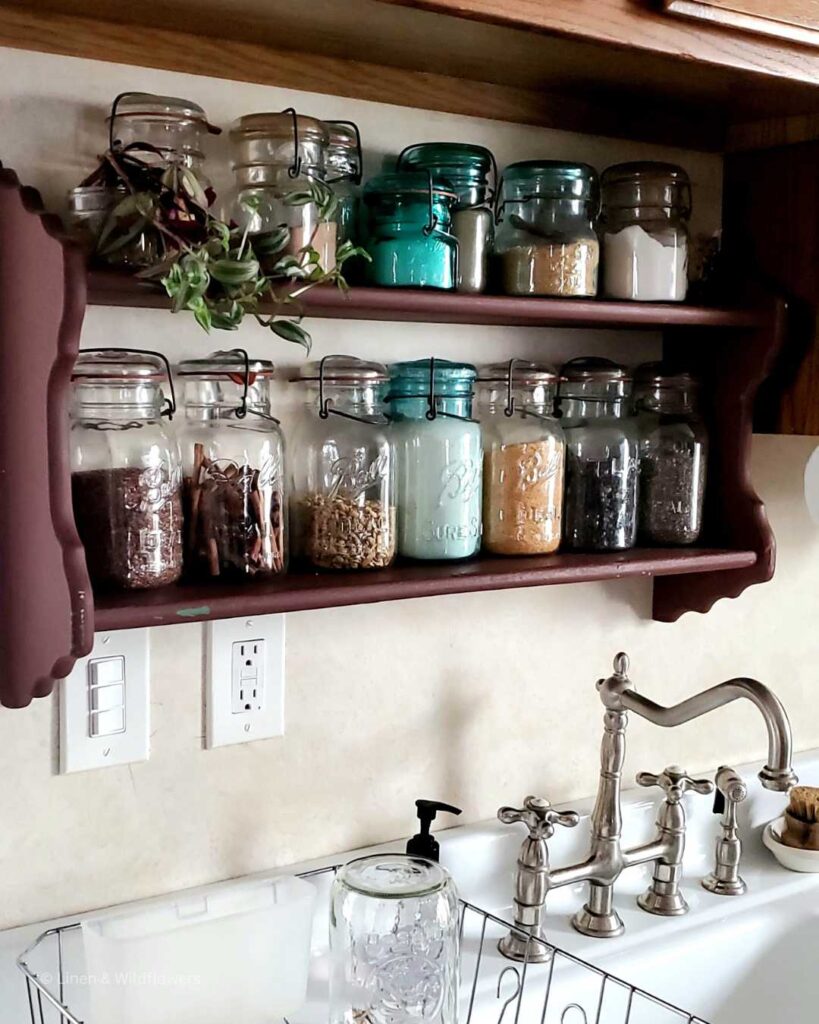
In conclusion, while antique jars may have a certain charm and appeal, it’s important to remember that they may not be safe for canning. To ensure the safety and quality of your preserved food, it’s recommended to use modern canning jars specifically designed for canning. These jars are made of tempered glass and have reliable sealing mechanisms that are less likely to fail during the canning process.
 If you want to follow along on our home restoration/renovation plans and all of our exciting antique & thrift finds, be sure to check out Linen and Wildflowers on Facebook, Instagram, and Pinterest! And don’t forget to sign up for our newsletter to receive updates.
If you want to follow along on our home restoration/renovation plans and all of our exciting antique & thrift finds, be sure to check out Linen and Wildflowers on Facebook, Instagram, and Pinterest! And don’t forget to sign up for our newsletter to receive updates.
Shop this Post!






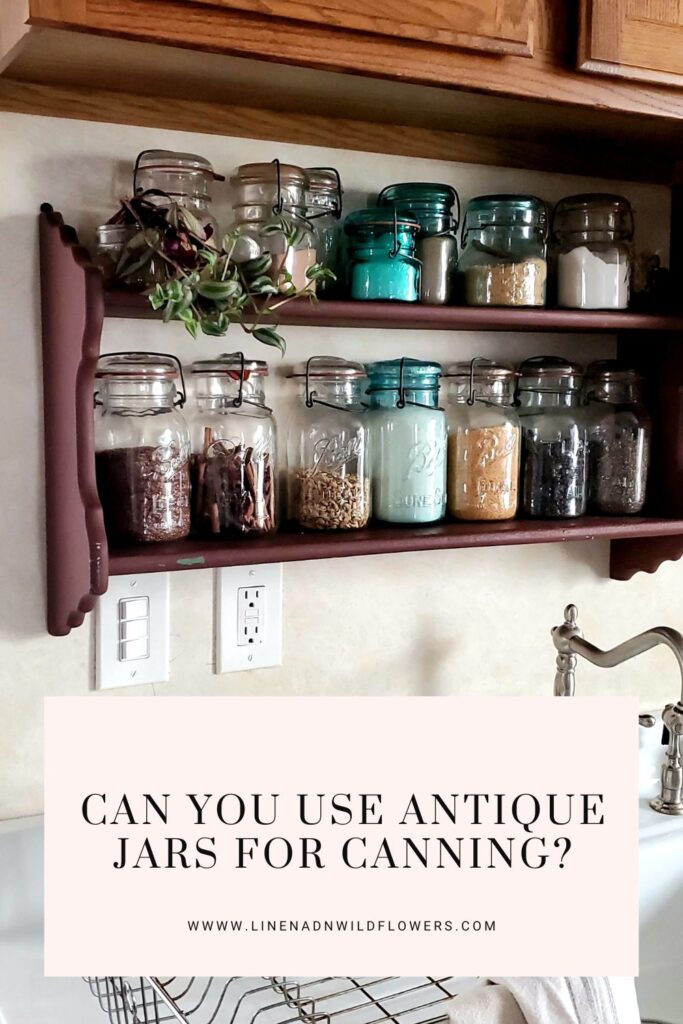
Leave a Reply